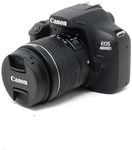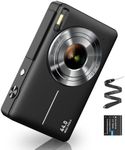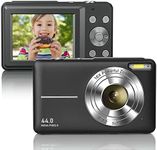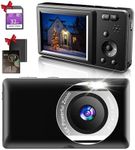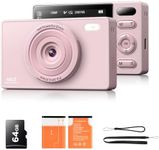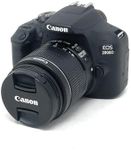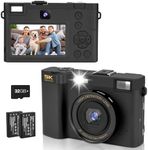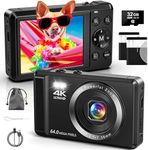Buying Guide for the Best Digital Camera For Beginners
Choosing a digital camera as a beginner can be an exciting journey into the world of photography. The key is to find a camera that balances ease of use with the ability to grow your skills. Start by considering what you want to photograph most often, whether it's landscapes, portraits, or action shots. This will help guide your choice in terms of features and specifications. Remember, the best camera for you is one that feels comfortable in your hands and inspires you to take more photos.MegapixelsMegapixels refer to the resolution of the camera's sensor, determining how much detail the camera can capture. More megapixels mean you can print larger photos without losing quality, but they aren't the only factor in image quality. For beginners, a camera with 12 to 24 megapixels is usually sufficient, as it provides a good balance between image quality and file size. Consider what you plan to do with your photos; if you're mostly sharing online, you won't need as many megapixels as you would for large prints.
Sensor SizeThe sensor size is crucial because it affects the camera's ability to capture light and detail. Larger sensors generally produce better image quality, especially in low light. Common sensor sizes include Full Frame, APS-C, and Micro Four Thirds. For beginners, an APS-C sensor is a great choice as it offers a good balance of quality and affordability. If you plan to shoot in low light or want more control over depth of field, consider a camera with a larger sensor.
Lens OptionsThe lens is as important as the camera body itself, as it determines the types of photos you can take. Some cameras come with fixed lenses, while others allow you to change lenses. Interchangeable lens cameras offer more flexibility and are a good choice if you want to experiment with different types of photography. Consider what you want to photograph; for example, a zoom lens is versatile for various subjects, while a prime lens is great for portraits.
Ease of UseEase of use is essential for beginners, as it affects how quickly you can learn and enjoy photography. Look for a camera with intuitive controls and a user-friendly interface. Some cameras offer guided modes or tutorials that can help you learn as you shoot. If you're new to photography, a camera with automatic modes and the option to switch to manual settings as you gain confidence is ideal.
Image StabilizationImage stabilization helps reduce blur caused by camera shake, which is especially useful in low light or when using a zoom lens. There are two types: optical and digital. Optical stabilization is generally more effective and is found in the lens or camera body. For beginners, having image stabilization can make a noticeable difference in the sharpness of your photos, particularly if you plan to shoot handheld or in challenging lighting conditions.
Video CapabilitiesMany digital cameras also offer video recording features, which can be a bonus if you want to capture moving images. Look for cameras that offer at least Full HD (1080p) video quality. If you are interested in vlogging or creating high-quality videos, consider cameras with 4K capabilities and features like a microphone input or a flip-out screen. Think about how important video is to you and choose a camera that meets your needs in this area.
Battery LifeBattery life is an important consideration, especially if you plan to use your camera for extended periods or while traveling. Cameras with longer battery life allow you to shoot more without needing to recharge or change batteries. Check the manufacturer's specifications for the estimated number of shots per charge. If you anticipate long shooting sessions, consider a camera with good battery life or the option to use external battery packs.
